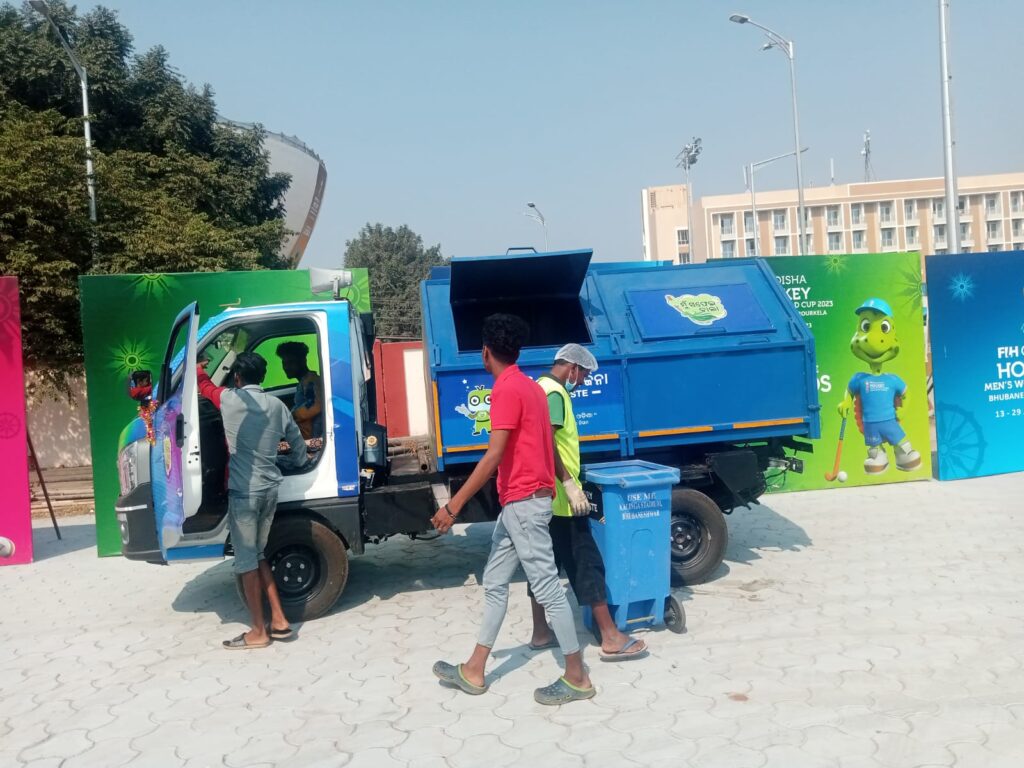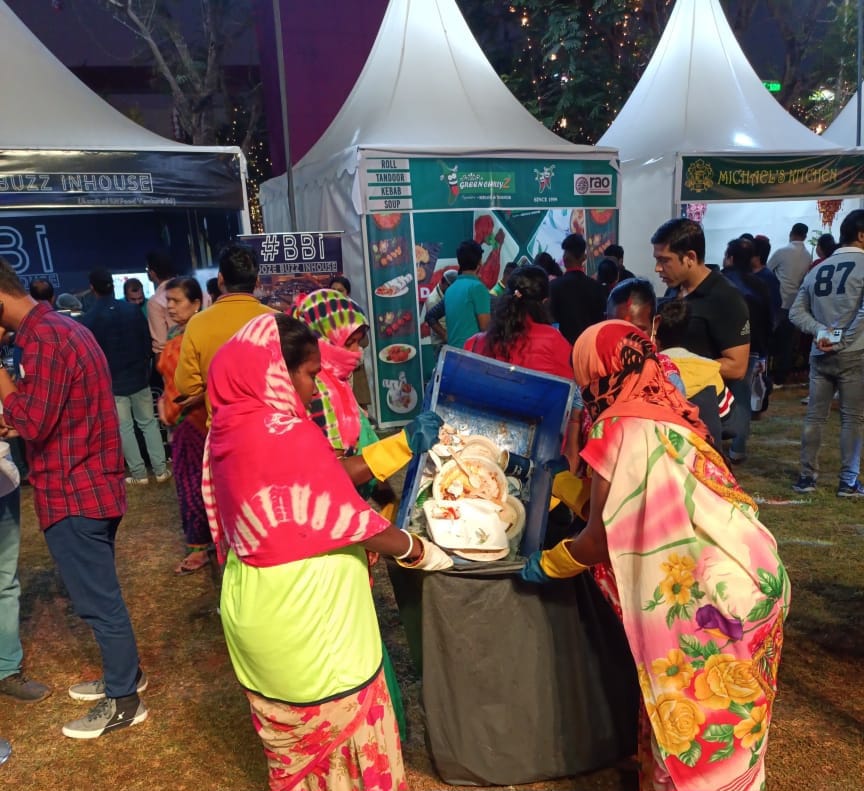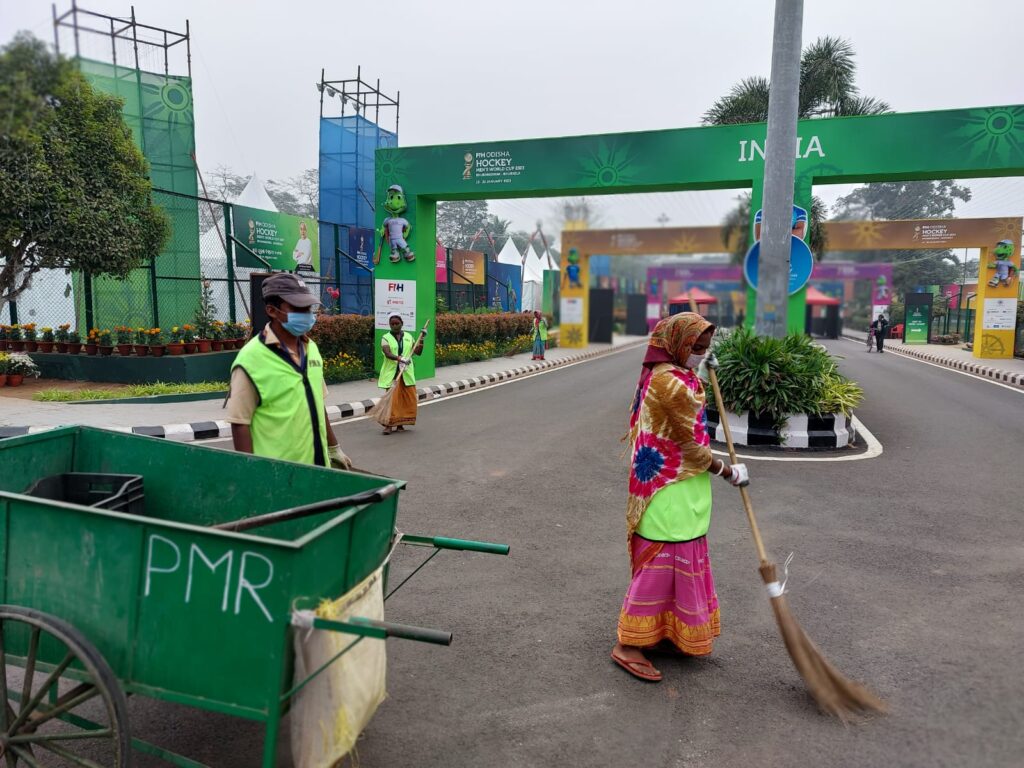Bhubaneswar Goes Spic-n-Span With Waste Management Drive
India has made remarkable progress since its independence in 1947. There is no denying the fact that India has come a long way in the path of development, however, there are certain aspects of development in which India still lags behind. One of them is maintaining cleanliness in comparison to other countries such as the USA or Singapore. India, irrespective of being a country which has numerous urban areas situated in it, hasn’t yet tackled the problem of seamless waste management. Like many Indian states, Odisha has been dealing with the problem of abysmal waste management since as long as one can remember. Recently, Bhubaneswar Municipal Corporation (BMC), taking a massive step to make Odisha’s capital the cleanest city in India, has introduced the ‘two-dustbin’ norm and has imposed stricter rules against public littering and open dumping of waste at random places. The violators have been warned of a penalty of Rs 5,000 if they fail to adhere to it. It has been about 3 months since this norm has been imposed and there is a mixed response to it by the public and authorities alike. My City Links went around the city to scavenge the journey of the city which is all set to become the cleanest city in the country.

Bhubaneswar set to become Cleanest City In India
BMC Mayor Sulochana Das aims to set a benchmark to turn the temple city into the ‘Cleanest City In India’ and seeks public support for the same. Amid the BMC drive against the violation of sanitation guidelines, Mayor Sulochana Das launched an initiative for a joint effort to turn Odisha’s capital into the cleanest city in India.
Stating that BMC alone cannot achieve the goal of a cleaner environment, the mayor had urged the participation of Bhubaneswar denizens in the segregation of waste in two separate dustbins. She also added that the BMC is working on providing alternatives to single-use plastic.
Several successful ‘Mo Ward’ meetings have also been conducted to make the residents of every ward aware of the necessity and benefits of waste segregation. “The first and foremost step to keep the city clean is to ensure door-to-door garbage collection for which dustbins have been removed from street corners in many areas. The second step is waste segregation so that the rule of ‘reduce, reuse, and recycle’ of waste management can be followed,” the mayor said in a press meeting.
It is pertinent to mention here that the BMC had cautioned residential houses, commercial establishments, vendors, and shopkeepers to keep two dustbins or else cough up Rs 5,000 as a fine. It also warned that handing over waste without segregation will attract a fine of Rs 500.
The BMC had collected a fine of Rs 65,000 from vendors and traders from different markets on October 11 and October 12, 2023, for sanitation guidelines violation and Rs 39,000 as a penalty for not using two dustbins to segregate dry and wet waste, scattering, and garbage dumping on the road. The shops and commercial establishments have also been instructed to purchase dustbins with twice the capacity of their waste generation on a day for their safe disposal every 24 hours.
BMC mandates two dustbins for shops, houses
Stepping up action against public littering and open dumping of waste at random places in the State Capital, the BMC came up with a fresh standard operating procedure (SOP). It states that the eateries, and commercial establishments as well as residential societies and individual households should keep two separate dustbins for the segregation of dry and wet waste while handing them over to the sanitation staff. This is carried out on a daily basis and is mandatory for all.
The new SOP came into effect owing to the negligence of the commercial establishments, especially the small vendors such as tea stalls, betel shops, tiffin centres, food carts, and vegetable vendors who continued to litter waste in public places, roads, and drains, which led to the clogging of stormwater channels and water-logging in the city.
The civic body has created a ward-wise list of shops and commercial establishments. The CCTV cameras installed across the city will be utilised to identify violators and keep a record of them. As per the SOP, all commercial establishments, including malls, large commercial establishments, small-scale vendors, food vendors, and traders, will have to maintain a garbage and litter free surrounding in a five-metre radius of their premises. The civic body also clarified that any litter dumped either by the shopkeeper or by the customer will be the liability of the shop owner himself.
Similarly, individual households, resident welfare associations, and gated societies will also have to follow these norms and keep five-metre areas of their premises clean. The SOP also mandates BMC to ensure regular collection of the segregated waste. The civic body is required to display the details of garbage collection vehicles and the contact numbers of their drivers and helpers at prominent places of wards for easy approach and disposal of wastes.

Mechanical garbage suction machines- Jatayu
Introducing a first-of-its-kind initiative in Odisha, the BMC has commenced services of two mechanical garbage suction machines called Jatayu to rid the city of dustbins.
BMC Mayor Sulochana Das in the presence of Deputy Mayor Manjulata Kanhar and Commissioner Vijay Amruta Kulange inaugurated Jatayu Cleaning Machine at Janpath near Census Office in December 2022. She also launched the equipment at the district centre in the Chandrasekharpur area.
“The machine is designed in such a way that it can suck up to 273 cubic feet (100 kg) of waste per minute, including green waste from vegetable markets, and can run for 10 hours at a stretch. It appears and works like an elephant’s trunk and is handled by an operator with a huge suction pipe protruding out of the van. After the hopper of the machine is full of garbage, it is then emptied,” said BMC Deputy Commissioner (Sanitation) Suvendu Sahu in a press meet.
Two agencies have been deployed for the machine- the agency ‘Jagruti’ deploys the machine for cleaning garbage from the main roads of the city, and another agency named ‘Pratyush’ cleans the internal roads of the city.
“The induction of a suction machine will pace up the clearing of pending waste at short notice. This will be beneficial while the civic body is engrossed in the collection and disposal of solid waste,” added Sahu.
Sahu also said that the machine can help clean up big grounds such as after rallies or after any government program. However, the usage of the machine for marriages and parties is yet to be decided. BMC officials said that the machine may require regular maintenance and even careful handling as the suction pipe is likely to be jammed at times. A tractor or any waste vehicle must be near it to take the bulk of waste to the micro composting centres or material recovery facility.
SAFA app launched to track garbage vehicles
To ensure hassle-free and real-time collection of waste, the BMC launched a mobile app in February 2023 to track vehicles involved in garbage collection. Waste segregation at source has been made mandatory. Named the ‘SAFA’ app, the vehicle is equipped with GPS and connected to the control room through which the residents give their feedback on issues of waste collection, transportation, and disposal. The app was first launched by BeMC (Berhampur Municipal Corporation) in 2019 by then Ganjam Collector, Vijay Kulange.
“It is a good way to monitor door-to-door collection, segregation, and efficiency of our vehicle. Also, it will track defaulters who are not giving segregated garbage or not putting waste in dustbins,” said a BMC official.
Every household and shop will put a QR code. After scanning the QR code, the attendant on a garbage vehicle will fill in the information within 15 seconds, whether the garbage is segregated or whether dustbins have been placed outside the house or shops. The feedback will be useful for improving the segregation and transportation of garbage.

Garbage lifting on Demand
Besides this, the app will also have another feature of ‘Garbage lifting on Demand’, wherein any hotel that wants garbage to be lifted can connect to the system and put in a request for the same. They will be directed toward the control centre and a vehicle will be deployed there. All the vehicles will have GPS tags. They can track the garbage collection vehicle status too.
Somalina Sahoo, a resident of Jharpada said, “This is a great initiative as it enables easy disposal of wastes generated. It is very essential to keep the house as well as its surroundings clean and hygienic at all times and this step is a welcome and much-appreciated measure taken by BMC. We’re looking forward to it.”
BMC’s clean mission for Hockey World Cup
Because of the massive Men’s Hockey World Cup, the BMC launched a massive cleanliness drive in the city in November 2022. From removing posters and banners on walls to sweeping dry leaves that gather under trees and repairing street lights, the BMC sanitation team geared up for its clean mission and successfully gave the city a major facelift.
The civic body prepared a 30-point agenda to take up intensive cleaning which also included the upkeep of footpaths. It identified garbage vulnerable points (GVP) to guide the sanitation workers to go out there and clean the areas. The sanitary inspectors prepared compliance reports to help the higher authority know if a particular area had been cleaned or not. Eventually, more than a thousand truckloads of garbage were cleared from vulnerable points.
“The cleaning was prioritised on a mission mode. The city needed to be presentable. Specific stretches had been identified as priority routes for carrying out makeover activities like fixing potholes, plugging other loopholes in the road network, covering drains, and removing hanging cables as far as possible,” an official said.
The BMC also reviewed the condition of footpaths so that it could repair them wherever necessary to make them look better. The parking and no-parking zones were earmarked with signage. The bus shelters were also repaired wherever required and tree guards, which were an eyesore at certain places, were removed.
While on its cleanliness drive, the BMC also took the opportunity with its squad to educate vendors and sanitation workers not to place dustbins on the road. All public toilets were under proper maintenance, the bicycle docks were cleaned and rooftop advertisements were not allowed. The BMC’s sanitation workers, who were reluctant to work at night, gaily joined work and cleaned the streets. During the day, manual sweeping was done while at night, both mechanical and manual sweeping was taken up.
Rashmi Pradhan, a sanitation worker said, “During and a month before the World Cup, our responsibilities had doubled. We were also assigned work post-midnight to keep the city clean for the citizens and the guests too. It was hectic in the beginning but later on, it felt good seeing the city so clean and groomed. I feel grateful that I am a part of this beautification of the city.”

BMC to stop dumping garbage at Daruthenga
A deadlock over the dumping of waste into a designated yard, Daruthenga, has lately been in controversy. Residents of Daruthenga panchayat, a few kilometres away from the city, have not been allowing trucks of the BMC to dump waste at the Bhuasuni dump yard over various demands. This created havoc as this temporary transit station in the Odisha capital brimmed with garbage. Subsequently, the dumping trucks were unable to collect waste from the bins.
Many streets in residential areas were plunged with litter scattered around the full bins and were stinking. The issue was further compounded by intermittent rain and workers of some private agencies ceasing waste collection over payment issues. Although the workers resumed work, the stalemate continued as talks with the Daruthenga sarpanch and the BMC did not lead to any breakthrough.
Daruthenga Sarpanch Tapan Chakravarty ensured that he would call for a gram sabha and details of the meeting would be discussed with the villagers. He added that he would inform the BMC of their decision in a couple of days after the discussion when they reach a final mutual conclusion. “The BMC sought a time period of nine months to clear the area. It is understandable that it cannot do biomining right now until the existing waste is cleared from the dump yard first,” he said.
Biomining is the excavation, segregation, and treatment of old solid waste in dumpsites through scientific means. Valuable resources like plastics, clothes, and bricks are recovered, followed by the waste’s sustainable management via recycling and processing.
“The meeting was successfully held in a cordial atmosphere. We had good discussions with a positive mind and the problem is sure to be resolved soon,” Mayor Sulochana Das told reporters.
Congress MLA Suresh Rourtray, under whose constituency Daruthenga falls, said villagers were ready to resolve the issue and move forward. “Bhubaneswar is a beautiful city and necessary steps have been taken to enhance its beauty. Machines will be installed to manage the waste. Similarly, measures will also be taken to make Daruthenga neat and clean,” he said after attending the meeting.
This outcry is not new. The residents of Daruthenga have been protesting since 2008 when the BMC commenced its operations of dumping waste at Bhuasuni, which is nearby. The mayor had earlier assured that the BMC wanted to dispose of each ward’s waste in the ward itself and convert it into compost. But that would take some time to be put into effect.
BMC commissioner Vijay Amruta Kulange said the civic body was very serious about installing micro composting centres to increase the capacity of processing garbage. Waste transportation to the yard in Daruthenga village will be gradually stopped within a year, it is speculated.
Citizens react
The denizens of the temple city have taken to this new routine of a clean and hygienic environment. Although there was much hay and cry when the two-dustbin norm and doorstep garbage collection was introduced, the successful implementation of the drive has changed people’s perspective.
Sunitarani Deo, a resident of Satya Nagar Housing Board Colony said, “Initially we were not very convinced with the removal of roadside bins. We were apprehensive that this would lead to more dumping of garbage on the roadside and create havoc. But within a few days, it became a habit to wait for the safaiwala and dispose of the waste systematically.”
On the other hand, some people find it quite a task to be dependent on the safaiwala to get rid of the waste accumulated at home. “I am a bachelor and work the night shift. I sleep till late in the afternoon. Earlier, I used to take the garbage accumulated with me during my evening drive and throw it in the bins provided on the streets. Now since it is not there, it is quite difficult. I have to wake up to attend safaiwala’s call.”
“This initiative is great but the removal of all the bins is not quite logical. A few bins at designated places in each area should be there for everybody’s convenience. People who litter outside the bins should be reported and punished,” he added.
Cleanliness is essential to ensure a healthy and disease-free environment. Mahatma Gandhi rightly said, “Be the change you want to see in the world.” Change starts with an individual. You can keep your surroundings clean, you can keep your neighbourhood clean, and in turn, you can set an example for others. One can discourage his/her peers to litter if one himself/herself does not indulge in the same. Let us all join hands and come together for a cleaner and healthier lifestyle.

Author: Aafreen Firdaus
Aafreen is a doting mother to several kitties and a doggo who loves to pamper everyone with delicious food. She is a free spirit and a wizard of words and she loves to tell beautiful stories through her writing. She is also a loving and caring soul, always ready to pitch in with a helping hand and a smile on her face.
Read more from author


